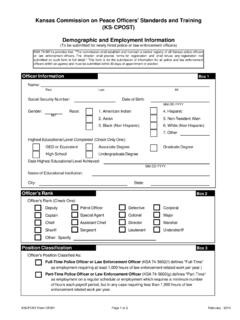Transcription of Integrity Bulletin - kscpost.org
1 Phone: (316) 832-9906. KS-CPOST Fax: (316) 832-9679. 1999 N Amidon Ste 350 Wichita KS 67203 Gary Steed, Executive Director Commission on Peace Officers' Jeff Colyer, , Governor Standards and Training Integrity Bulletin Volume 10 July 2018. The Kansas Commission on Peace Officers' Standards and Training (KSCPOST) is committed to providing the citizens of Kansas with qualified, trained, ethical, competent, and professional peace officers. It is also dedicated to adopting and enforcing professional standards for certification of peace officers to promote public safety and preserve public trust and confidence.
2 Anyone reading this Integrity Bulletin will recognize that KSCPOST is active in monitoring the actions of Kansas law enforcement and pursuing certification actions in appropriate cases. Kansas law enforcement officers should review and be thoroughly aware of the Kansas Law Enforcement Training Act (KLETA) and Kansas Administrative Regulations that regulate officer certifications. Both are readily available on our website. Law enforcement agencies should take note of the first three cases featured below in the Case Summaries, all of which involve charges of domestic battery.
3 As you can see, applicants with domestic violence convictions slip through the cracks in a variety of ways. Not only do these situations potentially expose your agency to liability, but they may also subject the officer to complications with federal and state prohibitions from possessing a firearm. When assessing applicants for employment as a law enforcement officer, keep in mind that: - Felony convictions and misdemeanor crime of domestic violence convictions are disqualifiers for certification, even if the case has been expunged.
4 - The definition of conviction in these cases includes diversion agreements and deferred judgments. - A new background check should be completed on every applicant for certification, even if that person has been employed by your agency in another capacity. - Even if an applicant with your agency is already certified as an officer, you should not assume they meet the minimum qualifications for certification. Your agency should vet the applicant before you submit a Demographic form to CPOST, in which you affirm under penalty of perjury that an applicant meets all the requirements.
5 CPOST is here to help! If you have questions about whether an applicant is qualified for certification, feel free to call us. Integrity Bulletin Volume 10 Kansas Commission on Peace Officers' Standards and Training Page 2. Case Summaries: An officer became certified in Kansas then moved to Oklahoma. While living in Oklahoma, the officer was charged with domestic battery against his estranged wife. The officer entered a deferred judgment in the case. The officer returned to Kansas ten years later and was hired by a different Kansas law enforcement agency.
6 He passed the KLETC Challenge exam and once again became full- time certified in Kansas. However, the officer no longer met the minimum qualifications for certification due to his conviction of a misdemeanor crime of domestic violence in Oklahoma. The training act is clear that a conviction includes a diversion, deferred judgment, or expungement. The agency did not catch the DV case when hiring the officer but located it after running a background check on the officer in consideration of a promotion. The officer did not cooperate with the CPOST.
7 Investigation. The officer's certification was revoked by Summary Order for violations of 74-5616(b)(1), 74-5605(b)(3) not have been convicted of a crime that would constitute a misdemeanor crime of domestic violence, 74-5616(b)(1), 74-5605(b)(5), 106-2-4 Good Moral Character, and 74-5616(b)(3) failing to cooperate in a commission investigation to determine a person's continued suitability for law enforcement certification. Years ago, an applicant applied for employment in a jail in a non-law enforcement position. The applicant had previously entered a diversion agreement for domestic battery.
8 A background check was run on the applicant and indicated that the employee was not eligible to carry a firearm due to his criminal history. However, the employee was not required to carry a firearm in his position at the jail, so he was hired. The employee performed well in his duties at the jail and was therefore hired as a certified law enforcement officer. The agency did not run a new background check on the employee, assuming the background originally run for employment at the jail was sufficient. Although the agency ran a background check on their employees each year, those were not carefully examined.
9 In 2018, a newly hired employee was more diligent about running background checks on all officers and located the officer's prior domestic battery conviction. The officer was employed as a law enforcement officer in Kansas for nearly fifteen years without meeting the qualifications for certification as a law enforcement officer. The officer's certification was revoked by Consent Agreement and Order of Revocation for a violation of 74-5616(b)(1), 74-5605(b)(3) not have been convicted of a crime that would constitute a misdemeanor crime of domestic violence.
10 An individual entered a diversion agreement in district court for domestic battery. This person later had the case expunged, and believed he was eligible for certification as a law enforcement officer. He was then hired and certified as a part-time officer. The officer attended college and obtained a degree in Criminal Justice. The officer began applying at other law enforcement agencies, hoping to become a Integrity Bulletin Volume 10 Kansas Commission on Peace Officers' Standards and Training Page 3. full-time certified law enforcement officer.














